14 downloads
Title of document: Factors Affecting the Decision-Making of Farmers on Rice Storage in Selected Areas of Ayeyarwaddy Region, Myanmar Authors: Yin Yin Nwet, Flordeliza A. Lantican, Corazon T. Aragon, Zenaida M. Sumalde Journal’s name if any: Ministry/Government Agency/Organisation: MOALI Year of publication: 2017 Geographic focus: Myanmar Main issues / topics addressed (for example: Introduction; Review of Literature; Theoretical and Conceptual Framework; Methodology; Results and Discussion …) School of agroecology (if any): Web address to original document (if any): Summary: Storage is an important component of the postharvest handling operations of agricultural products. Identification of the postharvest activities in rice farmers has been the focus of continuing study by agricultural economists. However, the individual characteristics and other socioeconomic factors that affect the farmers’ decisions on rice storage are not well understood, especially in Myanmar. This study examines the factors affecting the decision making of farmers on rice storage in Pyar Pon District, Myanmar. Qualitative choice model (binomial logit) was used to determine whether farmers’ choices of storing and non-storing options were significantly affected by their individual characteristics and other socio-economic factors. The factors found to be significantly affecting the farmer’s decision on rice storage were price of rice after storage, storage costs, education, and availability of equipment. Other factors like rice production, annual gross income, experiences in rice trading and gender were insignificant. Read More
4 downloads
Title of document: Rice Seed Marketing and Distribution Situation along Supply Chains ofLower Myanmar Authors: Thanda Kyi and Zar Ni Hlaing Journal’s name if any: Ministry/Government Agency/Organisation: MOALI Year of publication: Geographic focus: Myanmar Main issues / topics addressed (for example: Introduction; Results and Discussion; Conclusion; Policy Implication…) School of agroecology (if any): Web address to original document (if any): Summary: This study attempted to explore the marketing and distribution situation in the supply chain of rice seed in lower Myanmar. The survey was conducted from September to October, 2015. The stratified random sampling method was used to select the seed growers, seed dealers and farmers. Read More
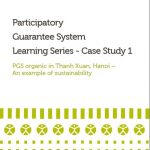
26 downloads
Title of document: Participatory Guarantee System Learning Series - Case Study 1 “PGS organic in Thanh Xuan, Hanoi – An example of sustainability” Authors: VECO Journal’s name if any: Ministry/Government Agency/Organisation: VECO, ALiSEA Year of publication: 2018 Geographic focus: Vietnam Main issues / topics addressed (for example: PGS organic in Thanh Xuan, Hanoi – An example of sustainability; Context; PGS operational model; PGS’ performance in Thanh Xuan…) School of agroecology (if any): Web address to original document (if any): Summary: Participatory Guarantee System (PGS) is a low-cost quality assurance mechanism that guarantees the quality of agricultural products and has the potential to regain consumers’ trust. Implemented in 66 countries worldwide, it has been used in Vietnam for over 10 years. As part of the project “Capitalisation of Participatory Guarantee System experiences in Vietnam for upscaling & institutionalisation”, Vietnam National University of Agriculture and Rikolto investigated all the existing PGS in Vietnam to assess their strengths and weaknesses and come up with recommendations on how to improve PGS in the Vietnamese context. This case study investigates the factors that made PGS Thanh Xuan the most successful PGS model in Vietnam and identifies some of the features that should be replicated by other PGS to improve their sustainability Read More
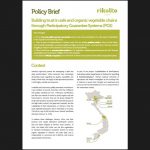
20 downloads
Normal 0 false false false FR X-NONE TH /* Style Definitions */ table.MsoNormalTable {mso-style-name:"Table Normal"; mso-tstyle-rowband-size:0; mso-tstyle-colband-size:0; mso-style-noshow:yes; mso-style-priority:99; mso-style-parent:""; mso-padding-alt:0in 5.4pt 0in 5.4pt; mso-para-margin:0in; mso-para-margin-bottom:.0001pt; mso-pagination:widow-orphan; font-size:10.0pt; font-family:"Times New Roman","serif"; mso-ansi-language:FR; mso-bidi-language:AR-SA;} Title of document: Building trust in safe and organic vegetable chains through Participatory Guarantee Systems (PGS) Authors: VECO Journal’s name if any: Ministry/Government Agency/Organisation: VECO, ALiSEA Year of publication: 2018 Geographic focus: Vietnam Main issues / topics addressed (for example: Context; What is PGS?; How does PGS work? What results have PGSs achieved in Vietnam?; What are current challenges?…) School of agroecology (if any): Web address to original document (if any): Summary: A Policy Brief ²Building trust in safe and organic vegetable chains through Participatory Guarantee Systems (PGS)² Read More
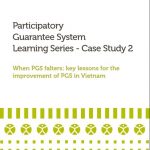
15 downloads
Title of document: Participatory Guarantee System Learning Series - Case Study 2 “When PGS falters: key lessons for the improvement of PGS in Vietnam” Authors: VECO Journal’s name if any: Ministry/Government Agency/Organisation: VECO, ALiSEA Year of publication: 2018 Geographic focus: Vietnam Main issues / topics addressed (for example: When PGS falters: key lessons for the improvement of PGS in Vietnam; Context; Challenges; Recommendations…) School of agroecology (if any): Web address to original document (if any): Summary: Participatory Guarantee System (PGS) is a low-cost quality assurance mechanism that guarantees the quality of agricultural products and has the potential to regain consumers’ trust. Implemented in 66 countries worldwide, it has been used in Vietnam for over 10 years. As part of the project “Capitalisation of Participatory Guarantee System experiences in Vietnam for upscaling & institutionalisation”, Vietnam National University of Agriculture and Rikolto investigated all the existing PGS in Vietnam to assess their strengths and weaknesses and come up with recommendations on how to improve PGS in the Vietnamese context. The case study below looks at one PGS in particular which has struggled with sustainability and operational effectiveness Read More
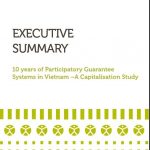
28 downloads
Title of document: 10 years of Participatory Guarantee Systems in Vietnam –A Capitalisation Study Authors: VECO Journal’s name if any: Ministry/Government Agency/Organisation: VECO, ALiSEA Year of publication: 2018 Geographic focus: Vietnam Main issues / topics addressed (for example: 10 years of Participatory Guarantee Systems in Vietnam – A Capitalisation Study; How does PGS work in Vietnam? …) School of agroecology (if any): Web address to original document (if any): Summary: Executive Summary: 10 years of Participatory Guarantee Systems in Vietnam –A Capitalisation Study Read More
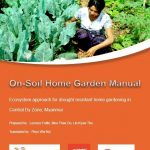
93 downloads
Title of document: On-Soil Home Garden Manual: Ecosystem approach for drought resistant home gardening in Central Dy Zone, Myanmar _ Version English and Myanmar Authors: Lorenzo Fellin, Moe Thae Oo, Lin Kyaw Thu Journal’s name if any: Ministry/Government Agency/Organisation: TDH, GRET/ALiSEA, AFD Year of publication: 2018 Geographic focus: Myanmar Main issues / topics addressed (for example: Home garden design and construction; Conservative Practices; Crop Plan; Garden Management…) School of agroecology (if any): Web address to original document (if any): Summary: Climate and soil type in the Dry Zone makes vegetable cultivation and availability extremely difficult, during the dry season and not only. From December to April most farmers of the area can only wait until the rainy season to begin cultivation of main crops, such as Pigeon Pea, Mung Bean, Sesame and Groundnut. However, the nutritional input given by fresh and green vegetable is often insufficient. The situation is worsened by climate change and the tendency of farmers to rely on extensive agriculture based on chemical input. While this approach might give initial benefits on productivity, it is highly unsustainable and deepens the environmental problems of the area (soil erosion, loss and desertification). However, thanks to the right techniques and conservative practices is possible to: cultivate all year round without relying on excessive chemical inputs; improve nutritional intake and decrease expenses on food. This has been the aim of ALiSEA project Ecosystem approach for drought resistant home gardening in Central Dry Zone implemented by TDH Italy: improving the livelihood of the beneficiaries through sustainable home garden vegetable production. The purpose of the following handbook is to provide the necessary information for the construction and management of a home garden using agroecological practices Read More
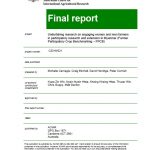
5 downloads
Title of document: Undertaking research on engaging women and men farmers in participatory research and extension in Myanmar (Farmer Participatory Crop Benchmarking – FPCB) Authors: Kyaw Zin Win, Nyein Nyein Htwe, Khaing Khaing Htwe, Thuzar Win, Chris Guppy, Matt Denton Journal’s name if any: Ministry/Government Agency/Organisation: ACIAR Year of publication: Geographic focus: Myanmar Main issues / topics addressed (for example: Background; Objectives; Methodology; Achievements against activities and outputs/milestones; Key results and discussion…) School of agroecology (if any): Web address to original document (if any): Summary: The Farmer Participatory Crop Benchmarking (FPCB) study was implemented as an 18-month pilot study in Magwe township in the Central Dry Zone and is the first of its kind in Myanmar. The farmer-participatory benchmarking provided both a methodology for developing scientific understanding on soil and crop management, and for developing a participatory adult-learning approach to extension. The project involved three key stakeholders, farmers, extension workers and research scientists, working together to identify constraints to crop yield and thereby raise productivity. Read More
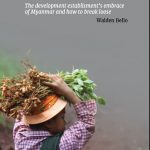
3 downloads
Title of document: Paradigm Trap: The development establisment’s embrace of Myanmar and how to break loose Authors: Walden Bello Journal’s name if any: Ministry/Government Agency/Organisation: TNI Year of publication: 2018 Geographic focus: Myanmar Main issues / topics addressed (for example: Introduction: Paradigm Trap; The Countryside: From Coercion to the Market; Extraction as Industrial Policy; Crony Capital: A Necessary Evil?…) School of agroecology (if any): Web address to original document (if any): Summary: Before elucidating this alternative paradigm, the report discusses Myanmar’s economic past and where it’s headed under the current paradigm. Starting with land and agriculture, it explains how the repressive extraction of the agricultural surplus coupled with massive land-grabbing produced a crisis-ridden and stagnant agriculture during the military regime. The paper then moves to a discussion of industrial policy, where it probes how and why the military regime’s experiments with industrialization failed, after which it lays out a critique of the foreign investment-led and export-oriented industrialization process promoted by the Japanese government, subjecting to close scrutiny the key pillars of this strategy: economic corridors to promote regional connectivity, special economic zones (SEZ’s), and the “fragmentation” of the process of production that is supposed to benefit Myanmar. Read More
23 downloads
Title of document: Food Security and Nutrition in Myanmar: Policy Landscape Authors: Thanda Kyi Journal’s name if any: Ministry/Government Agency/Organisation: MOALI Year of publication: Geographic focus: Myanmar Main issues / topics addressed (for example: Poverty situation, food security and income generation; Myanmar National Action Plan for Food and Nutrition Security; Draft framework for multi-sectoral national plan of action for nutrition…) School of agroecology (if any): Web address to original document (if any): Summary: For the agriculture sector, the aim is to increase the productivity and diversity of food stuffs and will focus on nutrient-dense crops, fish and animal-based foods, with an effort to integrate these into mixed farming systems Read More

 Asia & Mekong Region
Asia & Mekong Region  Cambodia
Cambodia  Laos
Laos  Myanmar
Myanmar  Other
Other  Vietnam
Vietnam